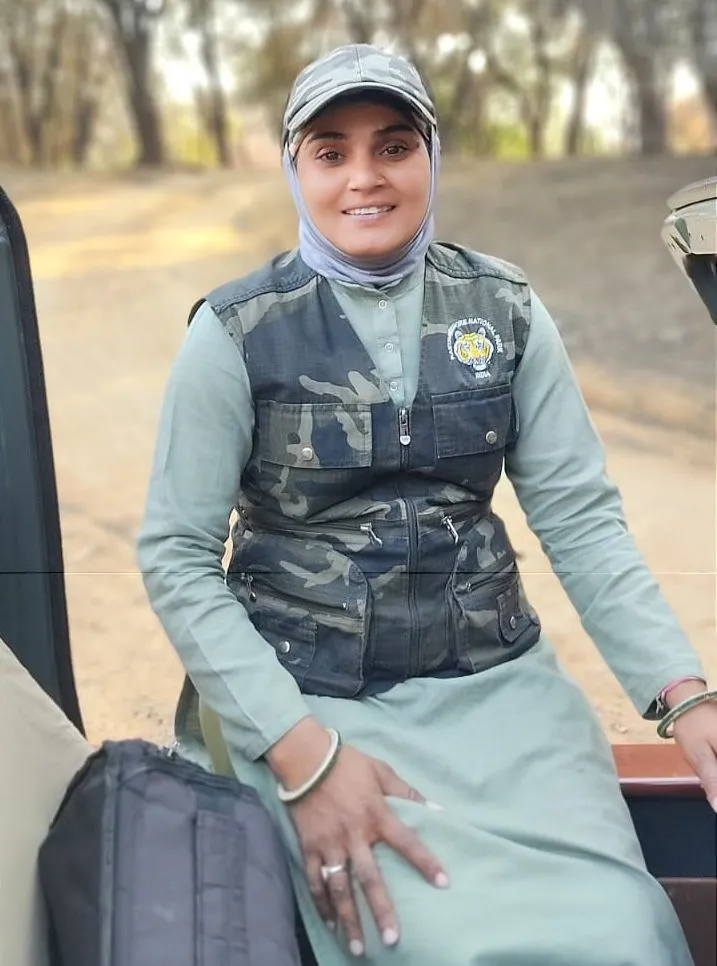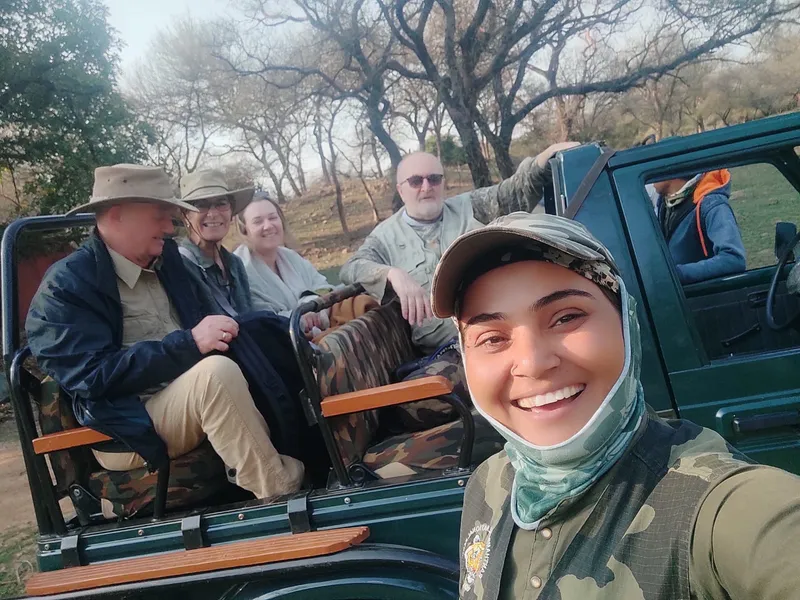Meet Suraj Bai Meena, who fought all odds to become a woman naturalist of Ranthambore National Park
Meena, who claims to be the first woman naturalist of Ranthambore National Park, has been honoured with awards such as the ‘Best Lady Guide’ by the Maharaja of Jaipur.
Suraj Bai Meena is a naturalist who leads daily safaris in Ranthambore National Park in Rajasthan. From morning to evening, her entire day is spent guiding visitors and informing them about the diverse animals and plants in the region.
Growing up in a village on the periphery of Ranthambore National Park, Meena developed a deeper understanding of the area’s wildlife and nature at a young age.
Meena’s brother, who also worked as a naturalist, started bringing tourists to the nearby villages for tours. Meena, with her broken English, loved to talk to them and aspired to speak fluent English.
She says, meeting and interacting with the tourists sparked her interest in becoming a naturalist.
“I had the relevant knowledge because we come from this area, but English was a blockade. Not just this, but in the place I come from, women were not allowed to go to school or study. Instead, they get used to getting married very early,” she tells SocialStory.

Suraj Bai Meena
Today, she claims to be the first woman naturalist of Ranthambore National Park. She is frequently invited to speak at local schools and has been honoured with awards such as the ‘Best Lady Guide’ by the Maharaja of Jaipur.
Fighting against odds
Meena says that she has six brothers and one sister, who left education after class 8 and was married. But this is not what Meena wanted her life trajectory to be.
Noticing her interest in guiding tourists, Meena’s brother encouraged her to start training for the Naturalist exam.
Meena was selected for training at 15 years of age by the Forest Department and eventually cleared the exam to get her licence in 2007.
During the training, Meena was taught about reptiles, different birds, animal behaviour, etc. Meena recalls that her training was in Hindi, so she took it upon herself to learn English by reading and translating Hindi pronouns, which her brother helped.
In the early days, she kept a small notebook to jot down any new words she heard during conversations. Once home, she would look up each word in the dictionary and note its meaning.
“It took me approximately one and a half years to learn conversational English,” she says.
Changing ecosystem
Meena shares that the forest is home to antelopes, deer, tigers, leopards, sloth bears, and many other animals. However, over the years, she has witnessed a drastic change in the ecosystem.
She mentions that Siberian cranes and falcons have stopped coming to the region. Meena believes that the influx of tourists and climate change are major reasons behind this decline.
“Since the habitat is changing, we are seeing changes in migratory birds and other species,” she adds. She also emphasises that many tourists litter in the area and throw plastic waste.

Suraj Meena makes 40 to 45 trips in a month.
“We as naturalists take responsibility for protecting the environment. So, we educate the tourists not to throw any plastic or waste around. We also try to collect any waste we see during our tours,” she adds.
Meena’s job seems very fascinating, but she notes that it can be dangerous at times.
She recalls a specific instance where a tigress started chasing the safari car and also tried to hop on the bonnet.
“These animals can be aggressive at times so we need to understand their behaviour to stay away from such risks,” she says.
Challenges
Meena’s journey so far has been a challenging one. She recalls that her family was not happy with her decision.
“There is a general notion–‘yeh ladko ke beech mein kaam karegi' (she will work among men) or ‘Padhi likhi ladkiyon ko rishte kam aate hain’ (educated girls get fewer marriage proposals),” she says.
Convincing her family was tough. However, she says her brother stood by her and motivated her to pursue this career. He also helped her in changing their family’s mindset.
Not just this, she believes that many tourists also discriminated her because of her caste. “I am a tribal, so sometimes people don’t listen to us and ignore us, which makes us feel bad,” she says.
Meena also emphasises that safety has been another big concern for her as she has to travel late at night to her village after work.
She notes that alongside her, four other women have trained as naturalists. While one chose not to pursue this career, the other two got married and left the profession.
However, she never left the ground.
Meena explains that out of the 1,700 sq km area of the park, only 400 sq km is open to visitors. There are 10 zones, and each guide is assigned one zone for a safari ride, which can cover around 25 to 30 km.
She adds that if visitors prefer a particular guide, they can book them through the website; otherwise, the guides are assigned zones based on a roster. Meena makes 40 to 45 trips in a month.
Today, when she sees other young girls thinking about education and building their career, she feels delighted.
“I am very happy my journey has inspired some young women to build a life for themselves,” she adds.
Edited by Megha Reddy








